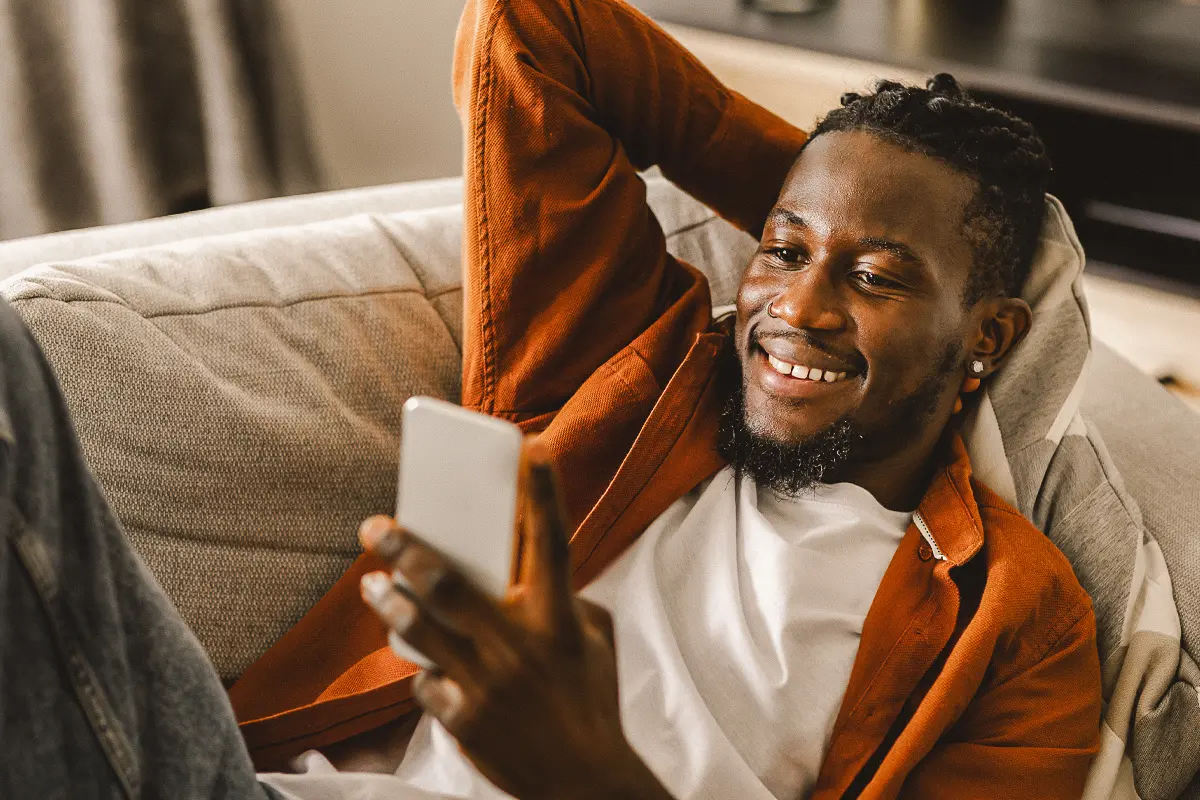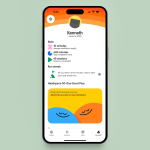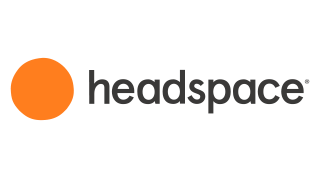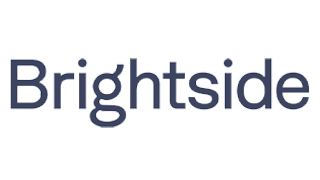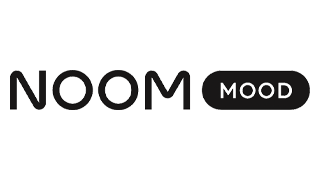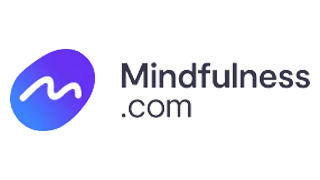Table of Contents
- We spent more than 10,000 hours researching over 70 mental health platforms, and our testers signed up for the 20 most popular mental health apps to bring you our top picks.
- Our testers test each mental health app for at least four weeks, focusing on the sign-up process, listening to audio sessions, engaging with activities, and watching mindfulness videos.
- We held focus group interviews with users and therapists and consulted over 60 mental health experts.
- Learn more about how we tested Headspace.
Key takeaways
- Headspace offers mindful meditations, sleep sounds, focus music, and podcasts to help calm an anxious mind.
- Subscriptions cost $12.99 per month, and coaching costs $99.99 per month.
- Headspace members report a decrease in stress and anxious feelings eight weeks after using the app regularly.
- Headspace is appropriate for adults, kids, and families.
Mental health apps can be a helpful tool in your toolbox to help you face challenges. Headspace, a meditation and sleep app, offers guided meditations and walks you through the mindfulness process step-by-step. Practices like focusing on your breath and observing your thoughts without judgment can train your brain to be more present, reduce stress, improve sleep, and help you develop a sense of self-compassion, calm, and control.
In a study of 21,088 Headspace members, 23 percent of respondents reported a decrease in moderate to severe stress from the beginning of using the app to when researchers followed up eight weeks later. The researchers also found that the more people engaged with the app through daily and weekly sessions, the better they felt. Read our Headspace app review to see if its offerings could be right for your mindfulness practice.
Headspace overview
In a mental health emergency:
Mental health apps are not appropriate resources to help in a mental health crisis. If you or someone you know is a danger to themselves or others around them, it is an emergency.
Don’t wait. You can find help immediately by:
- Visiting urgent care
- Calling or texting 988 for the Suicide & Crisis Lifeline
- Chatting online at 988lifeline.org
- Calling the Substance Abuse and Mental Health Services Administration (SAMHSA)’s Helpline at 1-800-662-4357 or text your zip code to 435748
All the above options will connect you with trained professionals who can provide crisis support. You can find even more resources, including international options, on our helpline directory page.
Insights from our tester
The Headspace mental health app offers mindfulness exercises like meditations and motivational stories to help you throughout your day. Although it isn’t an online therapy platform, this type of app may help you better handle mental health stressors. Meditation is also great for tempering the fight or flight response, which is prominent in anxiety. Doing so helps to release the brain fog people tend to experience when anxious or stressed.
The Headspace app has five main focus areas:
- Meditation: Exercises teach you to manage your feelings through quick meditations, guided breathwork, and courses.
- Sleep: Storytelling in a range of soothing voices, white noise and sleep sounds, sleep music, and guided wind-downs (meditations and breathing exercises) to prepare your mind for sleep.
- Movement: A variety of workouts, yoga, and stretching options varying from seven to 45 minutes to help you get moving.
- Focus: Music and meditation to boost your ability to focus on tasks.
- Wake up: You can listen to bite-sized motivational stories to start your day on a positive note.
Jenny Maenpaa is a licensed therapist, yoga instructor, and founder of New York City Psychotherapy Collective who recommends mediation to her clients to help them mentally reset. “Meditation is like a mental decluttering tool. Just as physical exercise strengthens your body, meditation strengthens your mind, helping you handle stress, anxiety, anger, and depression more effectively,” Maenpaa says.
Meditation has both mental and physical health benefits. For example, meditation has been shown to lower blood pressure and it can offset symptoms of depression and anxiety by helping people to focus on the present and learn to let negative thoughts go by.
Learning meditation and mindfulness practice can be challenging for beginners, and our tester was skeptical it would work for them. They say of their mindset going in: “I love yoga because it is like a guided meditation which requires me to use my body so my mind does not wander. I am skeptical of Headspace because therapists have recommended meditation to me before, but I have never been able to get myself to sit down and do it.”
After creating an account, our tester was greeted with the “Start Your Day” section. A typical day of activities on the Headspace app may look like:
Morning
- Mindful activity: Enjoy Five Deep Breaths (one minute). This activity helps you notice the natural rhythm of your body as you breathe, which can slow down your heart rate when you are anxious.
- The Wake Up: The Miraculous Migration of Salmon (three to seven minutes). This activity is like watching a soothing nature show, which is a gentle way to wake up rather than reading something jarring in the news or on social media, for instance.
- Today’s meditation: Present-Moment Awareness (three to 20 minutes). Focuses on the here and now and letting go of past worries or future concerns.
- Course: Basics (three to 10 minutes). This teaches you the fundamentals of meditation and mindfulness.
Afternoon
- Focus music: Bounce back (60 minutes). Helps you concentrate while doing tasks at home or work.
Nighttime
- Sleepcast: Downriver (45 minutes). Relaxing sounds to help you reset your mind for sleep.
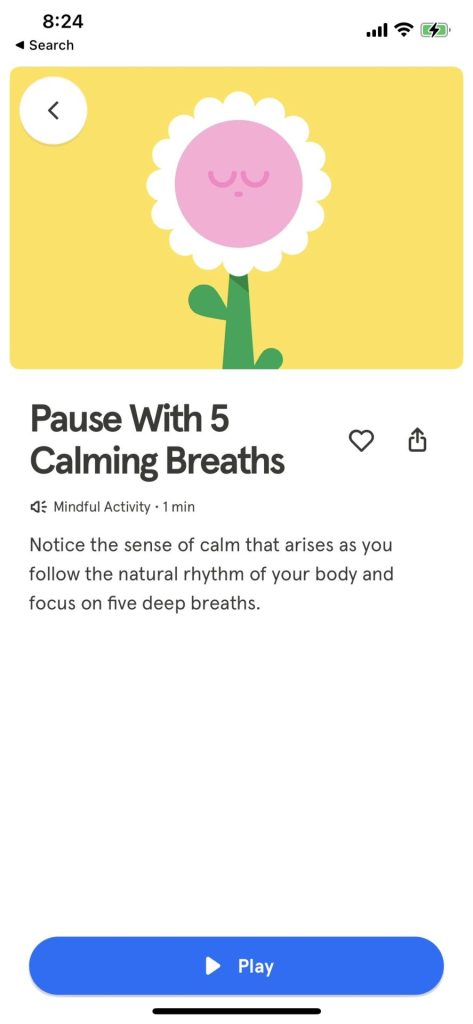
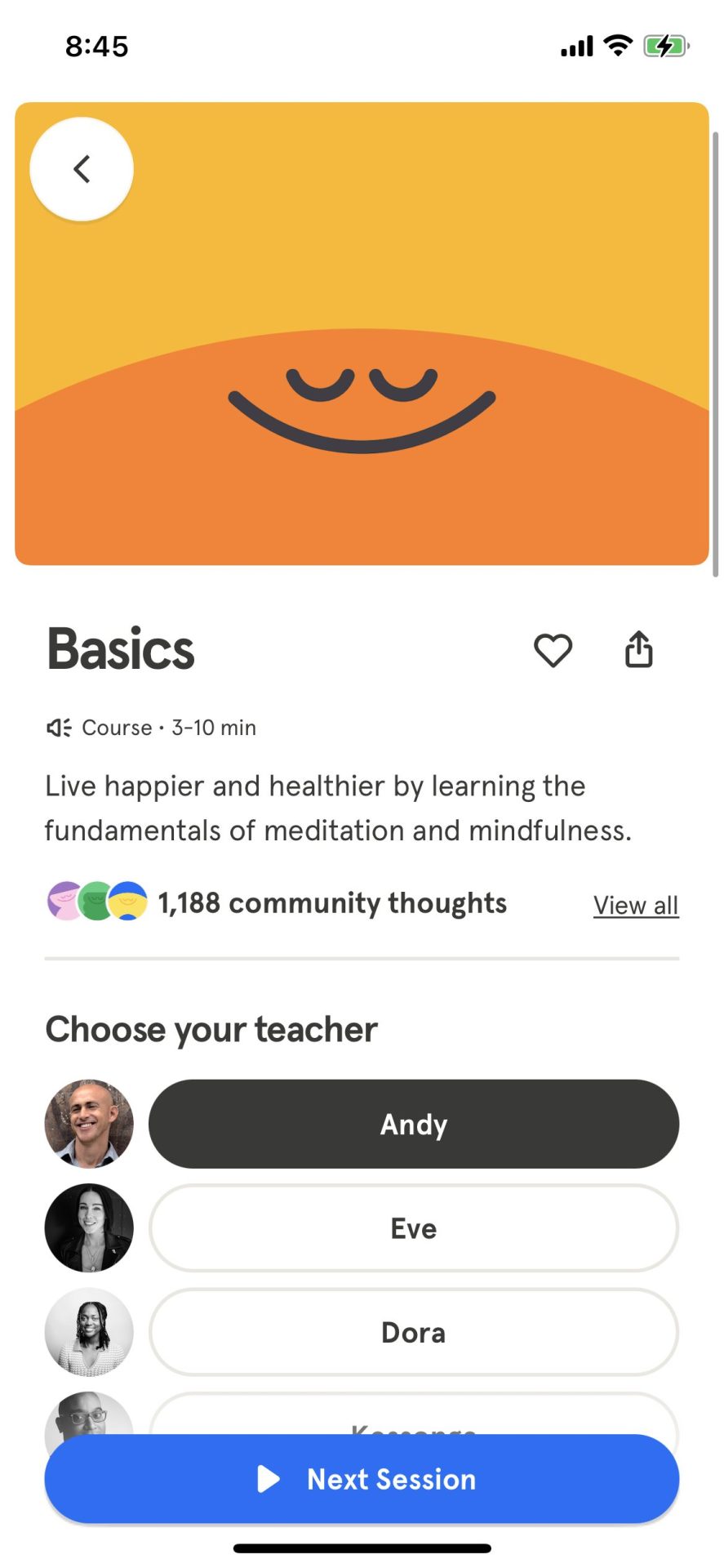
At first, our tester had difficulty concentrating when using the app because they were alone and had no accountability from another person. They were also easily distracted on their phone where they installed the Headspace app. But once our tester overcame the distractions, they enjoyed most of the sessions, despite their earlier reservations.
From our tester
“The five deep breaths exercise did exactly what it sounds like: It guided me through five deep breaths, telling me via text when to breathe in, hold, and release via text prompts. There was also the sound of waves and birds in the background.”
While our tester enjoys the meditation activities, they find some wake-up videos, like the informational video about salmon, less helpful. They say, “It is like watching the Nature Channel or Our Planet. I guess there could be something calming about this [salmon video] even though I didn’t find it to be.” If nature shows aren’t your thing, the app has other wake-up videos, like one on the day in the life of a bookbinder.
Our tester also didn’t find the focus music, which was classical music with nature sounds in the background, particularly helpful to them. They prefer to listen to their own musical selections when focusing on work—a concept that is backed by research. Listening to background music can help you concentrate when performing tasks that are not too demanding, but music preferences vary from person to person. For people who like jazz music, Headspace offers a jazz music library curated by singer John Legend.
Articles and podcasts
The Headspace app has articles to check out in between sessions, including the following:
- Meditation benefits.
- Mental health matters.
- Mindfulness with kids.
- How to get out of a rut.
- For stress and everyday anxiety.
- What makes someone a good sleeper?
- Helpful tips for riding out a panic attack.
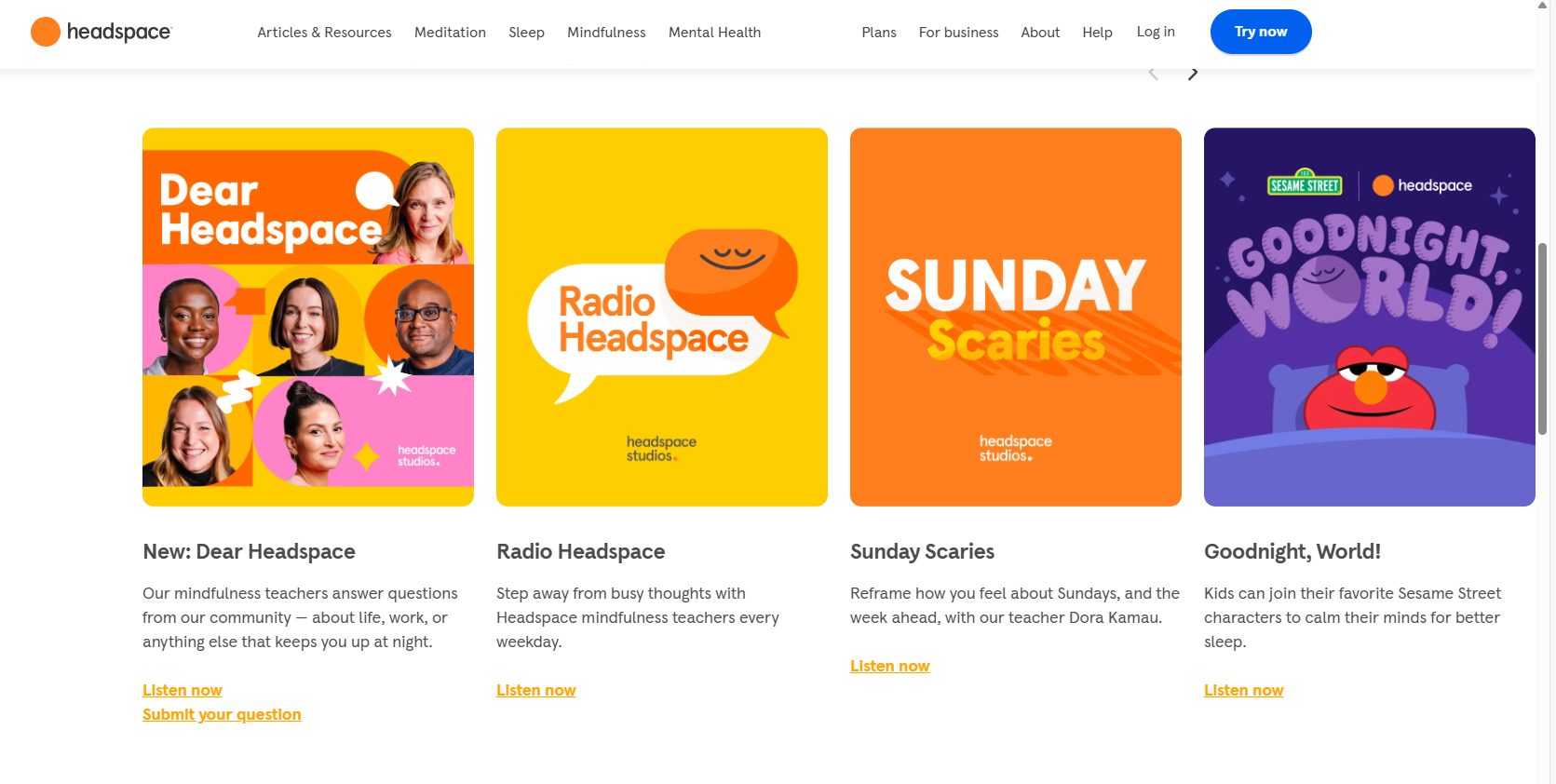
before bed, including:
- Dear Headspace: Mindfulness teachers answer questions from the Headspace community—about life, work, or anything else worrying you.
- Radio Headspace: To calm a busy mind when it needs to slow down.
- Sunday Scaries: For people who work a traditional Monday through Friday schedule and may want to reframe how they feel about Sundays and the week ahead.
- Goodnight World!: Kids can listen to Sesame Street characters lull them to sleep with calming bedtime stories and messages.
Headspace coaching
Headspace also offers coaching as an add-on service for an extra $99.99 per month. You may subscribe to coaching at a discounted rate for the first month if Headspace is offering a promotion.
Coaches are nationally board-certified by an accredited institution, such as the National Board for Health and Wellness Coaching (NBHWC), or have a master’s-level degree in a psychology-related field. Additionally, they have more than two years of relevant experience and have completed more than 200 hours of supervised training. But if you find you need additional mental health support from an accredited professional, you might seek an affordable online therapy option.
With Headspace coaching, you get access to:
- Personalized support from a mental health coach.
- Three text-based sessions per month.
- Live chat on the Headspace app.
The service will automatically renew monthly for $99.99, even if you get a discount for the first month. You can cancel anytime.
For Apple Health users
If you’re an Apple Health user on the latest iOS, you can pair Headspace with the Vitality Today app that tracks your wellness journey and meditation minutes. Follow these steps to connect them:
- Open the Apple Health app.
- Tap “Sharing” in the menu bar at the bottom.
- Tap “Headspace.”
- Make sure “Mindful Minutes” is turned on.
- After you complete your next session, you will be prompted to set up the app with your personal details.
What other users are saying
Many users find the Headspace app very useful for coping with worries, reframing stress, calming anxious thoughts, and clearing up mental clutter during the day. For people who struggle with sleep issues, Headspace can help by guiding you through relaxing activities to help you fall asleep and improve sleep quality. However, according to reviews in the Apple store, some users reported that they’d prefer the 10-minute sleep sessions to be longer.
Subscribers seem to prefer the Headspace app to the website version, even though some users in the Apple store report a few technical glitches on the app. Users have also reported that customer service can be hard to reach. If you have trouble with either the app or the website, you can reach customer service at [email protected].
Our testing experience
Our Handbook Team members research, download, and personally test mental health apps to find the best ones. To date, our testers have subscribed to seven top mental wellness apps to test mindfulness, meditation, sleep, and other app features. The Handbook Team explored the Headspace platform for four weeks, listening to audio sessions, engaging with activities, and watching mindfulness videos. We instruct testers to try the platform through the lens of a real user, paying attention to how easy or difficult it is to integrate these activities into their daily routine. They log their experience in a diary and share their findings from their weeks of testing. During that time, we do the following:
One detail we focus on is the sustainability of each app. A successful mental health app teaches you how to establish and maintain healthy habits for the long term. Our testing notes, other customers’ experiences, and health experts’ professional opinions all inform the conclusions in this review.
Mental health apps vs. online therapy platforms
Mental health apps and online therapy platforms fulfill different needs. Mental health apps support people in building healthy habits, such as meditation, positive thinking, and mindfulness, to enrich their lives. Online therapy platforms often have built-in apps with habit-building features, but their main benefit is access to one-on-one therapy with a licensed mental health provider.
Though you can use mental health apps on their own to help build healthy habits, the mental health professionals we spoke to for this review recommend using the apps together with therapy, especially if you’re trying to manage symptoms of depression, anxiety, or other mental health concerns. We recommend you try online therapy platforms, such as BetterHelp or Talkspace. Some platforms we’ve reviewed, like Brightside, also have apps that assist with therapy services if you enjoy using app features.
Who should maybe avoid Headspace
Those with severe mental health conditions, such as severe depression, bipolar disorder, or post-traumatic stress disorder (PTSD), should consult a mental health professional before starting a meditation practice, as meditation may bring up intense emotions that can be difficult to manage without professional support.
“While Headspace is generally safe and beneficial for most people, there are some individuals who should use caution or consult a health care provider before using the app,” says Natalie Rosado, LMHC, founder and owner of Tampa Counseling Place.
Compare Headspace with other mental health platforms
| Best for | Meditation | Combining therapy and guided mental health support in one app | Stress relief | Mindfulness |
| Monthly cost | $12.99 | $95–$349* | $37.25 (four-month auto-renew plan for $149) | $16.99 (or $84.99 annually) |
| Free trial | Yes | No | No | Yes |
| Works with | iOS and Android | iOS and Android | iOS and Android | iOS and Android |
*This app can only be used in conjunction with the one-on-one therapy offered on the platform.
Headspace cost and payment options
If you sign up for a regular subscription, Headspace offers two billing options:
- $69.99 billed annually ($5.83 per month) with a 14-day free trial.
- $12.99 billed monthly with a seven-day free trial.
The Talkspace Coaching subscription is an extra $99.99 a month on top of your subscription.
You must enter your payment information to access the free trial. Headspace auto-renews each month, so if you want to cancel your subscription, do so before your free trial period ends. Headspace accepts major credit credits and health savings accounts (HSA).
Headspace is free for teens ages 13–18 in the United States. Teens can access their free Headspace subscription through the platform’s partners:
- Peer Health Exchange: Individual access to Headspace’s mindfulness exercises and meditations.
- Bring Change 2 Mind: Schools can sign up to provide free access to Headspace for their students.
Headspace also offers older students a generous discount. Students age 18 and up are billed $9.99 annually or $0.83 per month. This offer is available for college students in the United States, United Kingdom, Australia, Canada, France, Portugal, and Spain. To see if you qualify, visit the Headspace – Student Plan, sign into your account or create a new one, and follow the instructions to see if you meet the eligibility criteria.
Our final verdict
The Headspace app is a mental health service for people beginning their journey with meditation and mindfulness practices. Headspace offers plans for individuals, kids, teens, adults, and families. The basic plan starts at $12.99 monthly, with discounts for students and free teen subscriptions.
In addition to meditation, Headspace offers sleep support, exercise videos, and motivational videos. For an additional $99.99 a month, you can access Headspace coaching to help you on your mental health journey. While Headspace can help reduce stress and reframe your mind, it is not an online therapy platform, so if you need mental health treatment, you should contact a mental health professional via online therapy or online psychiatry platforms.
Frequently asked questions
The Headspace app provides activities throughout the day to help you center mindfulness through meditation, improve focus, embrace exercise, and improve sleep. The app offers programs, ambient sounds, and videos to help you develop a better understanding of how your thinking operates. The app can also help you celebrate the positives in life more than putting energy toward the negatives.
Headspace offers two billing plans for its regular subscription—a $69.99 fee billed annually ($5.83 per month) with a 14-day free trial or a $12.99 fee billed monthly with a seven-day free trial.
Headspace is a mental health app for people who want to quiet the noise of the past, calm their worries about the future, and embrace the present. The app has sleep sounds, podcasts, articles, and activities to help you focus and relax.
- Callahan, C., Kimber, J., Hu, E., Tanner, L., & Kunkle, S. (2024, March 4). The real-world impact of app-based mindfulness on Headspace members with moderate and severe perceived stress: Observational study. JMIR Mhealth Uhealth, 12. Link
- Luders, E., Toga, A.W., Lepore, N., & Gaser, C. The underlying anatomical correlates of long-term meditation: larger hippocampal and frontal volumes of gray matter. (2009, April 15). Neuroimage, 45(3), 672–678. Link
- Jamil, A., Gutlapalli, S.D., Ali, M., Oble, M.J.P., Sonia, S.N., George, S., Shahi, S.R., Ali, Z., Abaza, A., & Mohammed, L. (2023, June 19). Meditation and its mental and physical health benefits in 2023. Cureus, 15(6). Link
- Kiss, L., & Linnel, K.J. (2021) The effect of preferred background music on task-focus in sustained attention. Psychological Research, 85(6), 2313–2325. Link



